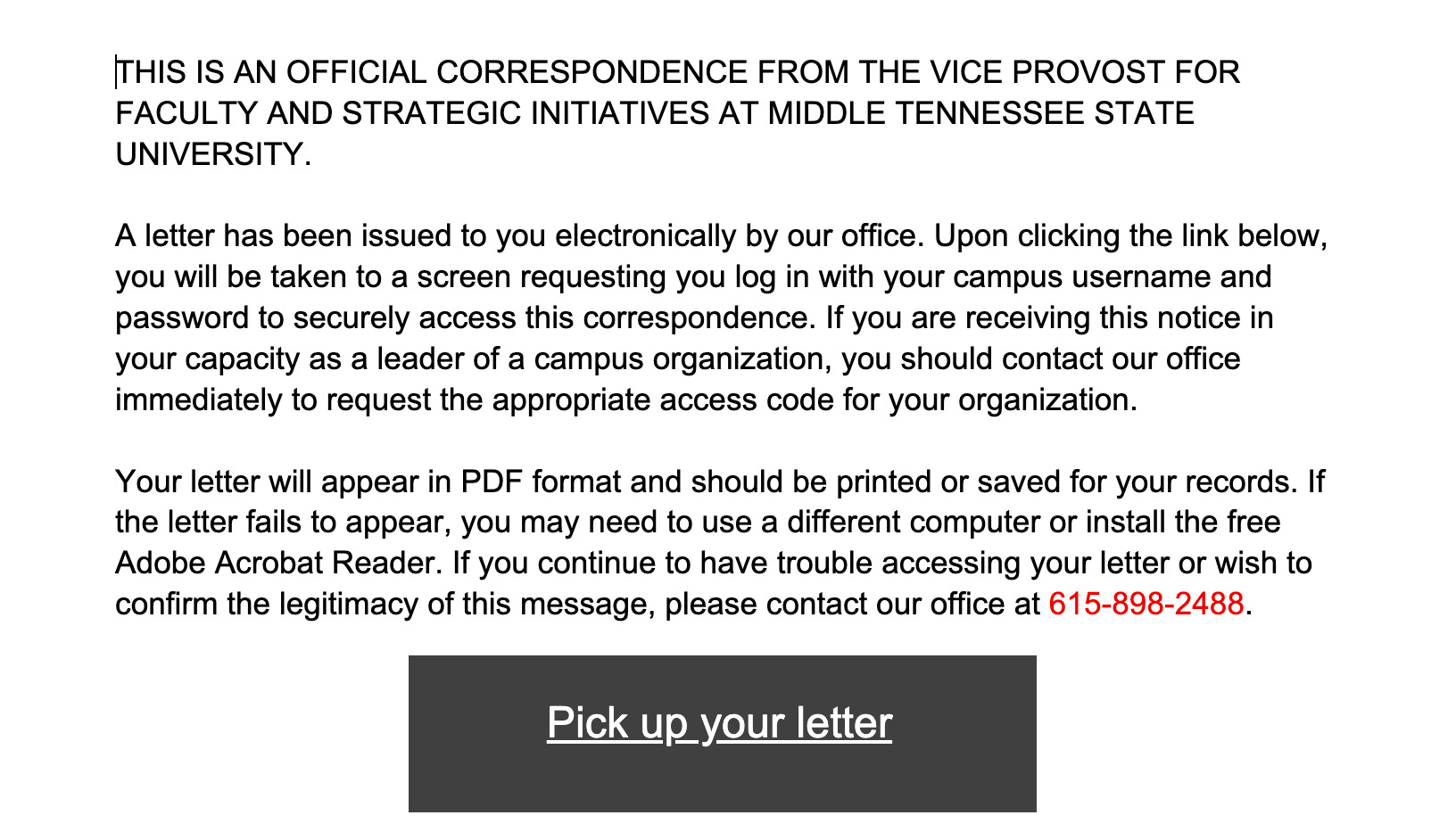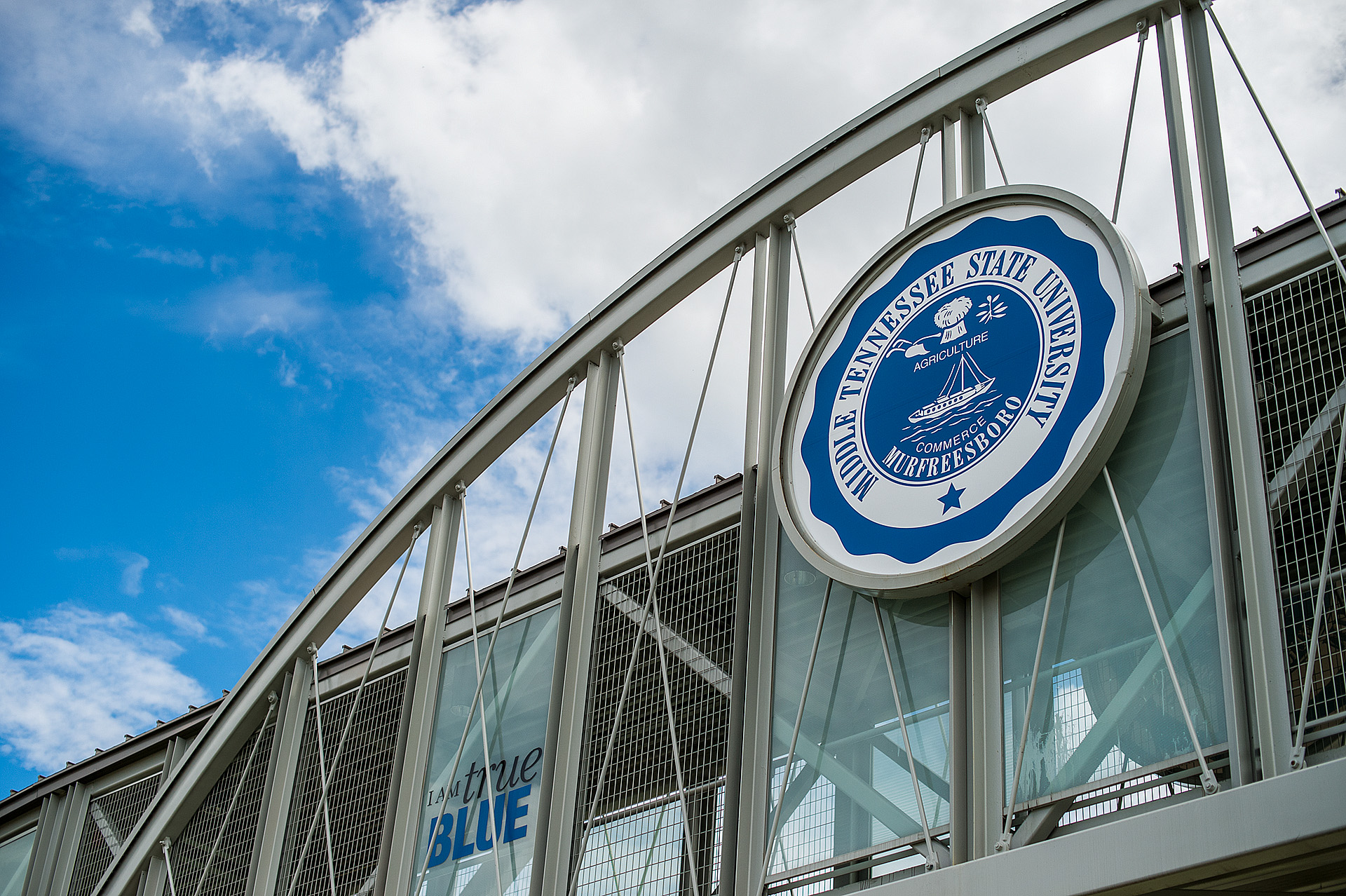Faculty and Strategic Initiatives
Academic Integrity
The Office of the University Provost, specifically the Vice Provost for Faculty and Strategic Initiatives, provides consultation, disciplinary referrals, educational outreach, and assistance for faculty alleging plagiarism, cheating, or fabrication in their classes. Please direct all questions and referrals to Brian Hinote, Vice Provost for Faculty and Strategic Initiatives, CAB 111, (615) 898-2488. All non-academic disciplinary matters should be directed to the Office of Student Care and Conduct.
The information and procedures referenced below appear in University Policy 312 Academic Misconduct, revised March 19, 2024.
What is an Academic Integrity Case?
Academic integrity violations may consist of acts of plagiarism, cheating, or fabrication.
- Plagiarism: Plagiarism includes, but is not limited to, the adoption or reproduction of ideas, words, statements, images, or works from another source as one’s own without proper attribution. This includes self-plagiarism, which occurs when an author submits material or research from a previous academic exercise to satisfy the requirements of another academic exercise and uses it without proper citation of its reuse. Plagiarism also includes the unauthorized use of paraphrasing tools or “text spinners” and artificial intelligence software.
- Cheating: Cheating includes, but is not limited to, using or attempting to use unauthorized materials, information, or aids in any academic exercise or test/examination. Cheating also includes unapproved collaboration, which occurs when a student works with others on an individual academic exercise without the express permission of the faculty member. Unapproved collaboration can also include, but is not limited to, sharing of any physical or electronic papers, exams/quizzes, assignments, and/or posting of same to unauthorized websites.
- Fabrication: Fabrication includes, but is not limited to, unauthorized falsification or invention of any information or citation in an academic exercise.
Going online and using information without proper citation, copying parts of other students’ work, creating information to establish credibility, or using someone else’s thoughts or ideas without appropriate acknowledgment is academic misconduct. If you have a question about an assignment, please ask for clarification. All cases of academic misconduct will be reported to the Vice Provost for Faculty and Strategic Initiatives and may result in failure on the test/assignment or for the course. When students participate in behavior that is considered to be academic misconduct, the value of their education and that of their classmates is reduced, and their academic careers are jeopardized.
Taking a test/quiz ONLINE is just like taking a test/quiz in a classroom. Unless you have the approval of your professor:
- You may not use your textbooks
- You may not use class notes
- You may not use additional websites
- You may not ask anyone for help
Using any knowledge resources without the explicit approval of your professor may be considered a violation of the Academic Integrity policy.
Why is Academic Integrity So Important?
An education at Middle Tennessee State University is to be valued. By violating the True Blue Pledge to be “honest in word and deed,” a student cheats not only himself or herself, but also the whole university. Further, the risks associated with damaging one’s academic reputation greatly outweigh the potential of a better grade.
What Happens if I Have Been Acccused of a Violation of Academic Integrity?
When an Academic Integrity referral is submitted, the Vice Provost for Faculty and Strategic Initiatives sends the following message to the student via MTSU email:

Students receiving this email must click on Pick up your letter. The letter advises the student that he or she is required to meet with the Vice Provost for Faculty and Strategic Initiatives. By ignoring the letter, students forfeit their opportunity to be involved in the investigatory process. (For more detail regarding the investigatory process, see Policy 312 and T.C.A. § 4-5-101.) Failure to retrieve the letter or attend the scheduled meeting will result in the student’s case being heard in absentia.
Depending on the outcome of the meeting between the student and the VPFSI, the case either ends or is presented to the Academic Integrity Committee.
Students found responsible for a violation of academic integrity, either directly or indirectly, through participation or assistance, are assigned appropriate sanctions. The faculty member may assign an appropriate grade for the exercise or examination, or assign an F in the course, depending on the nature and extent of the violation. Beyond the grade penalty, other potential disciplinary sanctions may be imposed, including, but not limited to, verbal or written reprimand, probation, suspension, or expulsion from MTSU.
Plagiarism Game
The below link will take you to an on-line educational game called “Goblin Threat”. This game – developed by Lycoming College – is designed to be a new approach in Academic Integrity education. Plus, it is fun!
The game requires Adobe Flash. A new version is being developed that will include touch screen usage. The link will update to the new version automatically when it is available.
Our thanks to Lycoming College and Snowden Library for allowing us use of this game.
Helpful Resources
- Purdue University Online Writing Lab (OWL). This authoritative website provides guidelines for both MLA and APA Style.
- How Not To Plagiarize. This University of Toronto resource helps students avoid plagiarizing.
- How to Prevent Unintentional Plagiarism (And What Happens If You Don’t) – IvyPanda Blog
- MTSU Writing Center
- Sanctions
